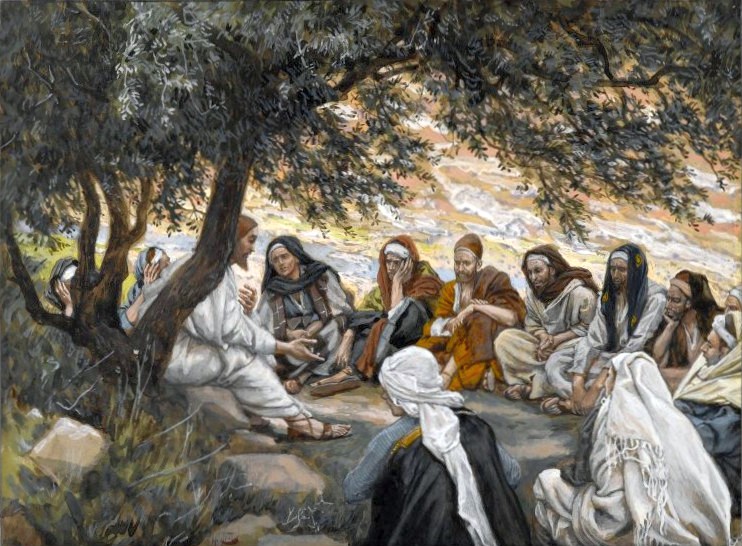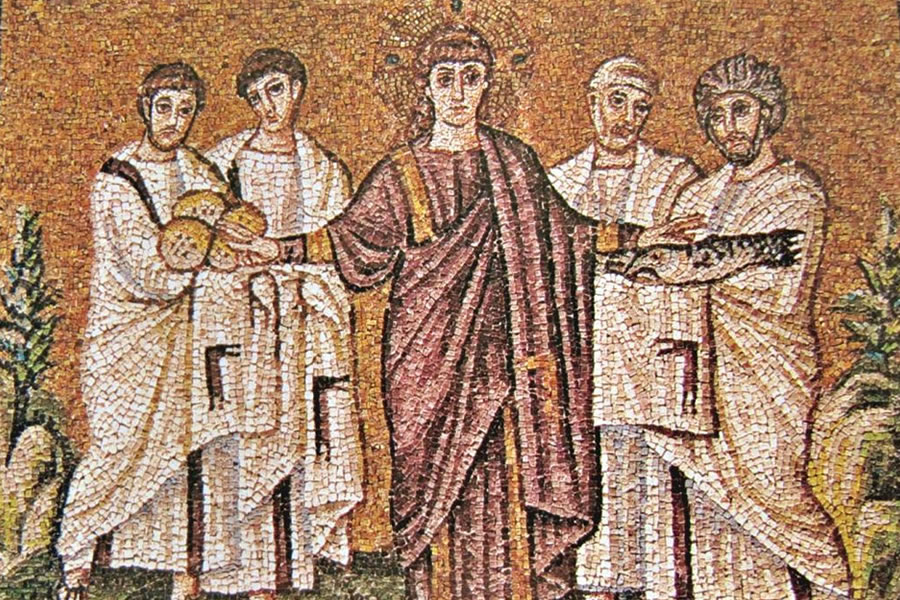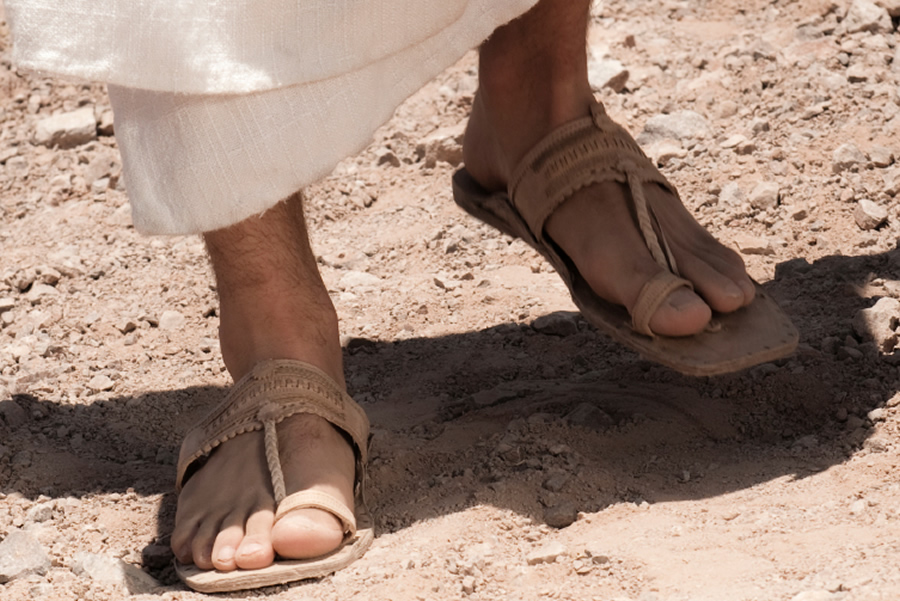St. Francis of Assisi Weekly Reflections

Divine Power
09-26-2021Weekly ReflectionWe Celebrate Worship Resource, Vol. 46, No. 3"Would that the Lord might bestow his spirit on them all!” Moses exclaimed to Joshua when he took offense that two elders who weren't part of the special gathering were prophesying as well (Numbers 11:29). John was similarly offended in the Gospel by a stranger driving out demons in Jesus’ name. The disciples felt that the power imparted by the spirit should be restricted to those who were authorized by Jesus himself. God’s generosity, however, is not limited. God sends the Holy Spirit to all who believe—Jew and Gentile, male and female, young and old. All of us received the power of the Holy Spirit in baptism. We each have the power inside us to drive out the demons in our lives and the lives of those around us. We are empowered by the Holy Spirit to proclaim and apply God’s word in what we say and do. Though some may say, “Stop him!” or “Prevent her!” if we are faithful to the Holy Spirit when we speak or act, we can accomplish great things.
What demons in your life or in your world need to be driven away? Do you recognize the power within you to do so?
Poder Divino
"¡Ojalá el Señor derramara su espíritu sobre todos ellos!" Moisés exclamó a Josué cuando se ofendió porque dos ancianos que no eran parte de la reunión especial también estaban profetizando (Números 11:29). Juan se sintió igualmente ofendido en el Evangelio por un extraño que expulsaba demonios en el nombre de Jesús. Los discípulos sintieron que el poder impartido por el espíritu debería restringirse a aquellos que fueron autorizados por Jesús mismo. La generosidad de Dios, sin embargo, no tiene límites. Dios envía el Espíritu Santo a todos los que creen: judíos y gentiles, hombres y mujeres, jóvenes y ancianos. Todos recibimos el poder del Espíritu Santo en el bautismo. Cada uno de nosotros tiene el poder dentro de nosotros para expulsar a los demonios en nuestras vidas y las vidas de quienes nos rodean. Tenemos el poder del Espíritu Santo para proclamar y aplicar la palabra de Dios en lo que decimos y hacemos. Aunque algunos pueden decir: "¡Detenlo!" o "¡Evítala!" si somos fieles al Espíritu Santo cuando hablamos o actuamos, podemos lograr grandes cosas.
¿Qué demonios en tu vida o en tu mundo necesitan ser ahuyentados? ¿Reconoces el poder dentro de ti para hacerlo?

Putting Others First
09-19-2021Weekly ReflectionWe Celebrate Worship Resource, Vol. 46, No. 3How often have you heard that you should always put yourself first? “Look out for Number One!” the saying goes. Not even Jesus’ closest friends totally rejected this principle. Not long after being told that they must deny themselves and take up their crosses, they argued over who was the greatest. James nailed the reason for their argument in his letter: “jealousy and selfish ambition” (James 3:16). Jealousy of others— turning them into rivals—and selfish ambition—creating envy of what you don’t have—cause discord and unhappiness, for not even those who come out on top are truly satisfied with what they have. Disagreements build to conflicts and conflicts build to wars in order to obtain more or protect what you already have. Life becomes a competition. The just and gentle one is attacked, for he stands in absolute contradiction to jealousy and ambition. Jesus uses the example of a child as a model, but he could have used anyone who has no power and no wealth and is totally dependent on others. These are the poor in spirit, whom Jesus calls blessed. Not preoccupied by selfish ambitions, they act selflessly, putting others first and taking up their crosses. This is what our Lord calls us all to do . This is the kind of person we are called to be.
When do you put yourself first? How will you put others before yourself?
Poniendo a los demás Primero
Con qué frecuenia has escuchado que siempre debes ponerte a ti mismo en primer lugar? “¡Cuidado con el Primero!” dice el dicho. Ni siquiera los amigos más cercanos de Jesús rechazaron totalmente este principio. No mucho después de que les dijeran que debían negarse a sí mismos y tomar sus cruces, discutieron sobre quién era el más grande. Santiago clavó la razón de su argumento en su carta: “celos y ambición egoísta” (Santiago 3:16). Los celos de los demás, convirtiéndolos en rivales, y la ambición egoísta, creando envidia de lo que no tienes, causan discordia e infelicidad, porque ni siquiera aquellos que salen en la cima están realmente satisfechos con lo que tienen. Los desacuerdos se convierten en conflictos y los conflictos se convierten en guerras para obtener más o proteger lo que ya tienes. La vida se convierte en una competencia. El justo y amable es atacado, porque está en absoluta contradicción con los celos y la ambición. Jesús usa el ejemplo de un niño como modelo, pero podría haber usado a cualquiera que no tenga poder ni riqueza y sea totalmente dependiente de los demás. Estos son los pobres de espíritu, a quienes Jesús llama bienaventurados. No preocupados por ambiciones egoístas, actúan desinteresadamente, poniendo a los demás primero y tomando sus cruces. Esto es lo que nuestro Señor nos llama a todos a hacer. Este es el tipo de persona que estamos llamados a ser.
¿Cuándo te pones a ti mismo primero? ¿Cómo pondrás a los demás antes que a ti mismo?

Selfless Acts
09-12-2021Weekly ReflectionWe Celebrate Worship Resource, Vol. 46, No. 3Saint James, whom we hear in the second reading, was especially concerned about the conduct of the early Christian community. He could not accept that anyone who believed in the Lord could fail to manifest their faith in the way they lived. What good is faith if it doesn’t change your behavior? For example, should it not engender a desire to share what you have with the needy? Jesus called his disciples to deny themselves and take up their crosses. The Christian life is demanding. Peter did not want to accept how demanding it would be for Jesus, so Jesus rebuked him, “Get behind me, Satan” (Mark 8:33). Awfully strong language addressed to one of his closest friends, the very disciple who just called him the Christ! But unlike Isaiah, he did not understand what being the Christ—the Messiah, in Hebrew—really meant. It meant accepting suffering, resisting temptation to put yourself first. Satan tempted Jesus in the desert to put himself first. No wonder Jesus refers to Peter by the same name now. Jesus died performing the ultimate selfless act. Whether it’s shouldering our crosses or feeding the hungry, we are called to act selflessly as well.
What sacrifice can you make to improve the life of someone else?
Actos Desinteresados
Santiago, a quien escuchamos en la segunda lectura, estaba especialmente preocupado por la conducta de la primera comunidad cristiana. No podía aceptar que cualquiera que creyera en el Señor pudiera dejar de manifestar su fe en la forma en que vivía. ¿De qué sirve la fe si no cambia su comportamiento? Por ejemplo, ¿no debería generar el deseo de compartir lo que tienes con los necesitados? Jesús llamó a sus discípulos a negarse a sí mismos y tomar sus cruces. La vida cristiana es exigente. Pedro no quiso aceptar lo exigente que sería para Jesús, así que Jesús lo reprendió: “Apártate de mí, Satanás” (Marcos 8:33). Un lenguaje terriblemente fuerte dirigido a uno de sus amigos más cercanos, ¡el mismo discípulo que acaba de llamarlo el Cristo! Pero a diferencia de Isaías, él no entendía lo que realmente significaba ser el Cristo, el Mesías, en hebreo. Significaba aceptar el sufrimiento, resistir la tentación de ponerte a ti mismo en primer lugar. Satanás tentó a Jesús en el desierto para que se pusiera a sí mismo en primer lugar. No es de extrañar que Jesús se refiera ahora a Pedro con el mismo nombre. Jesús murió realizando el último acto desinteresado. Ya sea que carguemos con nuestras cruces o alimentemos a los hambrientos, también estamos llamados a actuar desinteresadamente.
¿Qué sacrificio puedes hacer para mejorar la vida de otra persona?

“Ephphatha!”... be Opened!
09-05-2021Weekly ReflectionWe Celebrate Worship Resource, Vol. 46, No. 3It is no accident that the word Jesus uses to heal the deaf man in today’s Gospel, the word he speaks in his native tongue, “Ephphatha!” literally means “Be opened!” (Mark 7:34). It was not only this man’s ears that needed opening. Jesus also had to overcome many people’s closed-mindedness. Recall that last week the Pharisees and scribes questioned Jesus about eating with unclean hands. In response, Jesus travels to Gentile territory (unclean), encounters a person who is deaf (unclean) and has a speech impediment (unclean), and . . . touches him (especially unclean)! Not only does he touch the unclean man, Jesus specifically touched his ears and his tongue: supposedly the very manifestations of his sinfulness. No one is outside God’s grace and Jesus’ healing touch. No wonder James commanded Christians to be open to all outsiders, rich and poor alike. Like the streams and rivers in Isaiah’s rich language, Jesus’ healing grace flows among all those in need. How heartwarming it is that the first words that the man in the Gospel hears are the proclamations form the astonished crowd of the wonders that Jesus has done.
If Jesus were to tell you “Be opened!”, what would you see and hear that you are blind and deaf to now?
“¡Efatha!"... ¡Ábrete!
No ws casualidad que la palabra que Jesús usa para sanar al sordo en el Evangelio de ho,“¡Efatha!" (en su lengua materna), literalmente significa “¡Ábrete!” (Marcos 7:34). No eran solo los oídos de este hombre los que necesitaban abrirse. Jesús también tuvo que vencer la mente cerrada de muchas personas. Recuerde que la semana pasada los fariseos y los escribas le preguntaron a Jesús acerca de comer con las manos inmundas. En respuesta, Jesús viaja a territorio gentil (impuro), se encuentra con una persona que es sorda (impura) y tiene un impedimento del habla (impura), y. . . lo toca (especialmente impuro)! No solo toca al hombre inmundo, Jesús específicamente toca sus oídos y su lengua: supuestamente las mismas manifestaciones de su pecaminosidad. Nadie está fuera de la gracia de Dios y del toque sanador de Jesús. No es de extrañar que Santiago ordenara a los cristianos que estuvieran abiertos a todos los forasteros, ricos y pobres por igual. Como los arroyos y ríos en el rico lenguaje de Isaías, la gracia sanadora de Jesús fluye entre todos los necesitados. Cuán conmovedor es que las primeras palabras que escucha el hombre del Evangelio son las proclamas que forman la multitud asombrada de las maravillas que Jesús ha hecho.
¿Si Jesús te dijera “¡Ábrete!”, ¿Qué verías y oirías de lo que estás ciego y sordo ahora?

Are You Living the Word of God?
08-29-2021Weekly ReflectionWe Celebrate Worship Resource, Vol. 46, No. 3God’s word exhorts us to action, as we hear in the Letter of Saint James, “Be doers of the word and not hearers only” (1:22). Listening to the word of God is essential, but it is not enough. All three readings today can guide us. Moses tells the Chosen People that they must observe the commandments carefully, not only to keep the covenant, but also as a model for other nations, for outsiders will look upon their conduct and see the wisdom and worthiness of their laws. However, by the time of Jesus, the Word made flesh, the Pharisees and scribes were more about outward appearances than internal character. Jesus enumerated a baker’s dozen of sins that emerge from a person’s heart. Elsewhere he speaks of the conduct expected of someone who will inherit eternal life: treating your neighbor as yourself; feeding the hungry, welcoming the stranger, and visiting the sick and imprisoned; making disciples of all the nations. Let us not just listen to God’s word but go and live the word of God in all that we do.
How can you be a “doer of the word” in your daily life?
¿estas Viviendo La Palabra De Dios?
La palabra de Dios nos exhorta a la acción, como oímos en la Carta de Santiago: “Pongan en práctica esa palabra y no se limiten a escucharla” (1:22). Escuchar la palabra de Dios es fundamental, pero no es suficiente. Las tres lecturas de hoy pueden guiarnos. Moisés le dice al Pueblo Elegido que debe observar los mandamientos cuidadosamente, no solo para guardar el pacto, sino también como modelo para otras naciones, porque los forasteros verán su conducta y verán la sabiduría y el valor de sus leyes. Sin embargo, en la época de Jesús, el Verbo hecho carne, los fariseos y los escribas tenían más que ver con las apariencias externas que con el carácter interno. Jesús enumeró una docena de pecados de un panadero que surgen del corazón de una persona. En otra parte habla de la conducta que se espera de quien heredará la vida eterna: tratar al prójimo como a uno mismo; alimentar a los hambrientos, acoger al extraño y visitar a los enfermos y presos; haciendo discípulos de todas las naciones. No solo escuchemos la palabra de Dios, sino que vayamos y vivamos la palabra de Dios en todo lo que hacemos.
¿Cómo puedes “practicar la palabra” en tu vida diaria?

Do You Also Want to Leave?
08-22-2021Weekly ReflectionWe Celebrate Worship Resource, Vol. 46, No. 3Sometimes after making a promise, subsequent events lead you to change your mind. Joshua gave the twelve tribes of Israel an opportunity to do so, then he immediately renewed his commitment to the Lord. The others recommit as well. Centuries later, Jesus’ disciples faced the same decision. Jesus had just asked that they eat his flesh and drink his blood. Cue perhaps the saddest words in the Gospels outside of the Passion: “As a result of this, many of his disciples returned to their former way of life and no longer accompanied him” (John 6:66). Mind you, these are not Pharisees or scribes; these are his own disciples, the very people who chose to follow him always. And now they’ve left. So Jesus turns to the Twelve and asks them if they are going to leave, too. Simon Peter speaks on their behalf: “We have come to believe and are convinced that you are the Holy One of God” (6:69). Without Peter, there may have been no disciples to continue Christ’s mission. May his commitment in the face of Jesus' shocking words inspire us to affirm our own commitment to our baptismal promises.
Have you committed yourself to witness faithfully to the gospel?
¿Tabién Ustedes Quieren Dejarme?
Aveces, después de hacer una promesa, los sucesos posteriores le llevan a cambiar de opinión. Josué les dio a las doce tribus de Israel la oportunidad de hacerlo, luego inmediatamente renovó su compromiso con el Señor. Los demás también vuelven a comprometerse. Siglos más tarde, los discípulos de Jesús enfrentaron la misma decisión. Jesús acababa de pedirles que comieran su carne y bebieran su sangre. Indique quizás las palabras más tristes de los Evangelios fuera de la Pasión: “Desde entonces, muchos de sus discípulos se echaron para atrás y ya no querían andar con él.” (Juan 6:66). Eso sí, estos no son fariseos ni escribas; estos son sus propios discípulos, las mismas personas que eligieron seguirlo siempre. Y ahora se fueron. Entonces Jesús se vuelve hacia los Doce y les pregunta si ellos también, se van a ir? Simón Pedro habla en su nombre: “Nosotros creemos y sabemos que tú eres el Santo de Dios” (6:69). Sin Pedro, es posible que no hubiera habido discípulos para continuar la misión de Cristo. Que su compromiso frente a las impactantes palabras de Jesús nos inspire a afirmar nuestro propio compromiso con nuestras promesas bautismales.
¿Te has comprometido a testificar fielmente del evangelio?

Who Will You "Lift Up" Today?
08-14-2021Weekly ReflectionWe Celebrate Worship Resource, Vol. 46, No. 3Today we celebrate the completion of the Blessed Virgin Mary’s earthly life, when she was raised up to heaven for all eternity. The readings we hear today show that God has consistently lifted up those who are held dear, rescuing them for harm. In Revelation, the child destined to rule the world, born to the woman who was clothed with the sun and crowned with stars, is rescued from the carnivorous dragon, who symbolized the power of evil. In his Letter to the Corinthians, Paul points out that God raised Christ from the dead, ensuring the eventual defeat of death itself. In her beautiful Magnificat, Mary praises God for lifting up the lowly, rescuing them from the mighty kings who oppressed them. Notably, Mary held Jesus in her womb at the time she visited her cousin, so this means that the Word, to use John’s language, was already dwelling in her as she made this great prayer of praise. Listening to God’s word on this holy day, let us pray that the word of God may dwell in us as well and inspire us to lift up all those in need.
How can you go about lifting up those in need, rescuing them from oppression or hardship?
¿A Quien vas a “Levantar” hoy?
Hoy celebramos la culminación de la vida terrenal de la Santísima Virgen María, cuando fue elevada al cielo por toda la eternidad. Las lecturas que escuchamos hoy muestran que Dios constantemente ha levantado a quienes son queridos y los ha rescatado de cualquier daño. En Apocalipsis, el niño destinado a gobernar el mundo, nacido de la mujer vestida del sol y coronada de estrellas, es rescatado del dragón carnívoro, que simboliza el poder del mal. En su Carta a los Corintios, Pablo señala que Dios resucitó a Cristo de entre los muertos, asegurando la eventual derrota de la muerte misma. En su hermoso Magníficat, María alaba a Dios por enaltecer a los humildes, rescatarlos de los poderosos reyes que los oprimían. En particular, María tenía a Jesús en su vientre cuando visitó a su primo, por lo que esto significa que la Palabra, para usar el lenguaje de Juan, ya moraba en ella mientras hacía esta gran oración de alabanza. Al escuchar la palabra de Dios en este día santo, oremos para que la palabra de Dios también more en nosotros y nos inspire a levantar a todos los necesitados.
¿Cómo puedes levantar a los necesitados, rescatándolos de la opresión o las dificultades?

Jesus Asks us to Follow in His Journey
08-03-2021Weekly ReflectionWe Celebrate Worship Resource, Vol. 46, No. 3Elijah expected he would die. He didn’t think he would make it another day. He had fled into the desert because Jezebel, the wife of the king, had ordered his execution. Famished, for the region had just suffered three years of famine and drought, and now exhausted and desperate, Elijah prayed for death. But as he slept an angel of the Lord gave him bread and water. This sustenance from God strengthened Elijah to complete his forty-day journey to the mountain of God (think Noah on the ark, Jesus in the desert). Without it, he wouldn’t have made it one more day. Jesus promises his followers even more. He doesn’t just offer bread from heaven: he is the living bread from heaven. His bread doesn’t just strengthen us for an arduous journey; his very body strengthens us for the journey to eternal life. It took a second nudge from the angel, but Elijah responded by completing his journey to God. Now Jesus asks us to follow him on his journey.
How has God provided you with strength you’ve needed to carry on your journey through life?
Elías esperaba que muriera. No pensó que lograría ver otro día mas. Había huido al desierto porque Jezabel, la esposa del rey, había ordenado su ejecución. Hambriento, porque la región acababa de sufrir tres años de hambre y sequía, y ahora exhausto y desesperado, Elías oró por la muerte. Pero mientras dormía, un ángel del Señor le dio pan y agua. Este sustento de Dios fortaleció a Elías para completar su viaje de cuarenta días al monte de Dios (piense en Noé en el arca, Jesús en el desierto). Sin él, no habría logrado ni un día más. Jesús promete a sus seguidores aún más. No solo ofrece pan del cielo: Él es el pan vivo del cielo. Su pan no solo nos fortalece para un arduo viaje; su mismo cuerpo nos fortalece para el camino hacia la vida eterna. Fue necesario un segundo empujón del ángel, pero Elías respondió completando su viaje hacia Dios. Ahora Jesús nos pide que lo sigamos en su camino.
¿Cómo Dios te ha proporcionado la fuerza que necesitas para continuar tu viaje por la vida?

Whoever Comes to Him Will Never Hunger
08-01-2021Weekly ReflectionWe Celebrate Worship Resource, Vol. 46, No. 3What do we need to live? We need food and water, of course. Even more basic is oxygen, for without oxygen we could not breathe. Jesus takes each element to a new level. Today we hear Jesus tell a crowd that he can provide “food that endures for eternal life” (John 6:27). Earlier in John’s gospel Jesus told the woman at the well that he could give her living water. At Pentecost, he breathed on his disciples to give them the Holy Spirit. Food, water, and oxygen are basic to sustaining life here on earth, but Jesus gives us what we need to sustain life eternally. The Chosen People, journeying across the desert, were convinced they would die of famine. The Lord rained down manna from heaven for them to share and eat. During difficult times, like a famine or a pandemic, we share food with those less fortunate. Jesus, the “true bread from heaven” (John 6:32), gave his very self to nourish and sustain us. He fed thousands with loaves and fish to satisfy their hunger for one day, but he was truly sent to satisfy our hunger forever. Jesus is the bread of life, the bread that gives life to the world, the bread that sustains us throughout our lives and into eternal life. Whoever comes to him will never hunger.
How does receiving the Lord in the Eucharist sustain you?
Quien Viene a él, Nunca Tendrá Hambre
¿Qué necesitamos para vivir? Necesitamos comida y agua, por supuesto. Aún más básico es el oxígeno, porque sin oxígeno no podríamos respirar. Jesús lleva cada elemento a un nuevo nivel. Hoy escuchamos a Jesús decirle a la multitud que él puede proveer “alimento que permanece para vida eterna” (Juan 6:27). Al principio del evangelio de Juan, Jesús le dijo a la mujer del pozo que podía darle agua viva. En Pentecostés, sopló sobre sus discípulos para darles el Espíritu Santo. La comida, el agua y el oxígeno son básicos para mantener la vida aquí en la tierra, pero Jesús nos da lo que necesitamos para mantener la vida eternamente. El Pueblo Elegido, que viajaba por el desierto, estaba convencido de que moriría de hambre. El Señor hizo llover maná del cielo para que lo compartieran y comieran. Durante tiempos difíciles, como una hambruna o una pandemia, compartimos la comida con los menos afortunados. Jesús, el “verdadero pan del cielo” (Juan 6, 32), se entregó a sí mismo para nutrirnos y sostenernos. Él alimentó a miles con panes y pescado para satisfacer su hambre por un día, pero realmente fue enviado para satisfacer nuestra hambre para siempre. Jesús es el pan de vida, el pan que da vida al mundo, el pan que nos sostiene a lo largo de nuestra vida y en la vida eterna. Quien viene a él, nunca tendrá hambre.
¿Cómo te sostiene el recibir al Señor en la Eucaristía?

Jesus Gave them as Much as they Wanted
07-25-2021Weekly ReflectionWe Celebrate Worship Resource, Vol. 46, No. 2Jesus is followed by a large crowd in today's Gospel, like the sheep without a shepherd we heard him encounter last week, and he finds a way to fill their needs and serve them all. He serves them quite literally, multiplying the loaves and fish so that thousands of people have not just enough to eat, but more than enough, more left over than they had in the first place. Next week we will hear Jesus call himself the bread of life, but today he shows us. He is the source of our sustenance, each time we come together to celebrate the Eucharist, just as he was two thousand years ago on this mountain. Significantly, in both of today’s readings that involve the miraculous multiplication of food for the holy man, Elisha.
In the Gospel it is a child, surely not expecting the pivotal role he will play in this event. In both cases, the Lord transformed something that ordinary people produced and offered so that it is able to satisfy everyone in need. What can you offer to people in need that the Lord can transform to satisfy more than you ever expected?
Jesús les Dio de Todo lo que Quisierion
Jesús es seguido por una gran multitud en el Evangelio de hoy, como la oveja sin pastor que le oímos encontrar la semana pasada, y encuentra la manera de satisfacer sus necesidades y servirles a todos. Los sirve literalmente, multiplicando los panes y el pescado para que miles de personas no solo tengan lo suficiente para comer, sino más que suficiente, más de lo que tenían al principio. La semana que viene escucharemos a Jesús llamarse a sí mismo el pan de vida, pero hoy nos lo muestra. Él es la fuente de nuestro sustento, cada vez que nos reunimos para celebrar la Eucaristía, tal como lo fue hace dos mil años en esta montaña. Significativamente, en las dos lecturas de hoy que involucran la multiplicación milagrosa de alimentos para el santo hombre, Eliseo. En el Evangelio es un niño, seguramente sin esperar el papel fundamental que desempeñará en este evento. En ambos casos, el Señor transformó algo que la gente común producía y ofrecía para que pudiera satisfacer a todos los necesitados.
¿Qué puedes ofrecer a las personas necesitadas que el Señor pueda transformar para satisfacer más de lo que esperaban?

What Moves you to Compassion?
07-18-2021Weekly ReflectionWe Celebrate Worship Resource, Vol. 46, No. 2Our God is an empathetic God. God cares for us, for all of us, like a good shepherd cares for all his or her sheep. In Jeremiah, the Lord condemns shepherds who do not take care of their flocks, promising that they will be replaced by shepherds who will. Jeremiah specifically says that the sheep will “no longer fear and tremble,” showing that God’s care is not just for their general well-being, but more deeply for their emotional health (Jeremiah 23:4). The passage actually concerns kings and their subjects, but speaking of shepherds and sheep is an apt metaphor. In God’s eyes, a ruler’s first responsibility is the welfare of their people. Jesus puts this empathy into practice in the Gospel. First he feels empathy for his disciples, who were exhausted from their mission. But when Jesus sees the crowd, “his heart was moved with pity” (Mark 6:34). His heart goes out to the mass of people and he refocuses his attention on them, immediately addressing these “sheep without a shepherd” (6:34). By doing so, he is showing his apostles what their hearts should compel them to do. He is showing us too.
What moves you to compassion? Do you feel others’ needs in your heart?
¿Qué te Mueve a la Compasión?
Nuestro Dios es un Dios empático. Dios se preocupa por nosotros, por todos nosotros, como un buen pastor se preocupa por todas sus ovejas. En Jeremías, el Señor condena a los pastores que no cuidan de sus rebaños, prometiendo que serán reemplazados por pastores que lo hagan. Jeremías dice específicamente que las ovejas “ya no temerán ni se espantarán”, mostrando que el cuidado de Dios no es solo por su bienestar general, sino más profundamente por su salud emocional (Jeremías 23:4). El pasaje en realidad se refiere a los reyes y sus súbditos, pero hablar de pastores y ovejas es una metáfora adecuada. A los ojos de Dios, la primera responsabilidad de un gobernante es el bienestar de su pueblo. Jesús pone en práctica esta empatía en el Evangelio. Primero siente empatía por sus discípulos, que estaban agotados por su misión. Pero cuando Jesús vio a la multitud, “su corazón se llenó de piedad” (Marcos 6:34). Su corazón está con la masa de gente y vuelve a centrar su atención en ellos, dirigiéndose de inmediato a estas “ovejas sin pastor” (6:34). Al hacerlo, les está mostrando a sus apóstoles lo que sus corazones deberían obligarlos a hacer. Él nos lo está mostrando a nosotros también.
¿Qué te mueve a la compasión? ¿Sientes las necesidades de los demás en tu corazón?

How will You Carry out His Mission?
07-11-2021Weekly ReflectionWe Celebrate Worship Resource, Vol. 46, No. 2Jesus takes a back seat to his disciples in today’s Gospel. Indeed, he puts them on center stage, sending them out to perform their roles according to his detailed direction. Drive out demons, cure those who are ill, preach repentance. Take only a single tunic, a pair of sandals, and a walking stick— the things you need to walk from house to house or town to town. Don’t preoccupy yourself with ordinary concerns like food, shelter, and supplies. Focus only on what is life changing. Jesus, mind you, was not tired of doing it all himself. He realized that being fully human, he could not preach, teach, and heal all by himself forever. He needed the disciples to do what they’d seen him do. This foreshadows the resurrected Jesus, who before ascending to the Father, commissioned his disciples to go to the ends of the earth preaching the gospel, baptizing, and making disciples. They could do it then because they had done it before. Similarly, God called prophets like Amos to speak God’s word to the people. Later, Jesus called upon Saul/Paul to proclaim the risen Lord to all nations. Today we are the disciples Jesus commissions. Driven by the Spirit, who has done it before, we become the ones called to teach, to proclaim the gospel, to make new disciples.
How is Jesus sending you forth to carry on his mission?
¿Cómo llevarás a cabo Su Misión?
Jesús pasa a un Segundo plano frente a sus discípulos en el evangelio de hoy. De hecho, los pone en el centro del escenario, enviándolos a realizar sus roles de acuerdo con su dirección detallada. Expulsa a los demonios, sana a los enfermos, predica el arrepentimiento. Lleve sólo una túnica, un par de sandalias y un bastón, las cosas que necesita para caminar de casa en casa o de pueblo en pueblo. No se preocupe por preocupaciones ordinarias como la comida, la vivienda y los suministros. Concéntrese solo en lo que cambia la vida. Jesús, fíjate, no estaba cansado de hacerlo todo él mismo. Se dio cuenta de que, siendo completamente humano, no podía predicar, enseñar y sanar por sí mismo para siempre. Necesitaba que los discípulos hicieran lo que le habían visto hacer. Esto presagia al Jesús resucitado, quien antes de ascender al Padre, comisionó a sus discípulos para que fueran a los confines de la tierra predicando el evangelio, bautizando y haciendo discípulos. Podían hacerlo entonces porque lo habían hecho antes. De manera similar, Dios llamó a profetas como Amós para predicar la palabra de Dios al pueblo. Más tarde, Jesús llamó a Saulo/Pablo para que proclamara al Señor resucitado a todas las naciones. Hoy somos los discípulos encargados de Jesús. Impulsados por el Espíritu, quien lo ha hecho antes, nos convertimos en los llamados a enseñar, a proclamar el evangelio, a hacer nuevos discípulos.
¿Cómo te envía Jesús para llevar a cabo su misión?

When I am Weak, Then I am Strong
07-04-2021Weekly ReflectionWe Celebrate Worship Resource, Vol. 46, No. 3“Home sweet home,” we say, but sometimes home is not comfortable and peaceful, it is upsetting and hostile. Prophets discover this, for their first mission is often to criticize their own people. For example, Ezekiel, an Israelite himself, was told by the Lord, “I am sending you to the Israelites, rebels who have rebelled against me” (Ezekiel 2:3). In the Gospel, Jesus faces a similarly hostile crowd. Teaching in the synagogue where he grew up, likely calling for repentance and a reversal of the status quo, he faced opposition from those who would not accept wisdom from this simple carpenter’s son. We can find this sort of difficulty today. When we see evil, apathy, or injustice in our own families, among our own neighbors, or within our parish, it’s tough to speak out, knowing that we will upset people we know well, whom we have to live with. Let us look at Saint Paul as a model of strength in the face of opposition. He wrote that he was “content with weaknesses, insults, hardships, persecutions, and constraints, “for he found strength in Christ and in the life-giving message he preached, so he could say “when I am weak, then I am strong” (2 Corinthians 12:10).
When have you spoken out among your own family, friends, or colleagues?
Cuando soy Débil, Entonces soy Fuerte
“Hoger dulce hoger”, decimos, pero a veces el hogar no es cómodo ni pacífico, es perturbador y hostil. Los profetas descubren esto, porque su primera misión a menudo es el criticar a su propia gente. Por ejemplo, el Señor le dijo a Ezequiel, quien era un israelita: “Te envío a los israelitas, un pueblo rebelde, que se ha sublevado contra mí” (Ezequiel 2:3). En el Evangelio, Jesús se enfrenta a una multitud igualmente hostil. Cuando enseñaba en la sinagoga donde creció, probablemente pidiendo el arrepentimiento y una reversión del status quo, enfrentó la oposición de aquellos que no aceptarían la sabiduría del hijo de un simple carpintero. Hoy podemos encontrar este tipo de dificultad. Cuando vemos maldad, apatía o injusticia en nuestras propias familias, entre nuestros propios vecinos o dentro de nuestra parroquia, es difícil hablar, sabiendo que molestaremos a las personas que conocemos bien, con quienes tenemos que vivir. Miremos a San Pablo como modelo de fuerza frente a la oposición. Escribió que estaba “alegre con las debilidades, los insultos, las necesidades, las persecuciones y las dificultades”, porque encontró fuerza en Cristo y en el mensaje vivificante que predicaba, para poder decir “cuando soy más débil, entonces soy más fuerte ”(2 Corintios 12:10).
¿Cuándo has protestado entre tu propia familia, amistades o colegas?